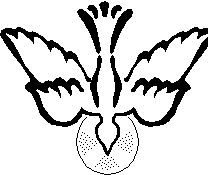~Lord Roghen~ said:
share your ideas.
personnaly, i believe the holy spirit is the greatest gift from Jesus after his ascension. some others say it is the love between Father and son, which echos throughout the universe...
:162:
Firstly, I am in agreement with a member here (I forget who - most likely Scott 1) who prefers holy Ghost to holy spirit.
I see the holy ghost as being that element of God that exists everywhere, that lives in us. Almost a distinct facet of God that is everywhere, in us, if we choose to accept it......as opposed to God and Jesus Christ.
From the catholic Encyclopedia:-
http://www.newadvent.org/cathen/07409a.htm
The doctrine of the
Catholic Church concerning the Holy Ghost forms an integral part of her teaching on the
mystery of the
Holy Trinity, of which
St. Augustine (De Trin., I, iii, 5), speaking with diffidence, says: "In no other subject is the danger of erring so great, or the progress so difficult, or the fruit of a careful study so appreciable". The essential points of the dogma may be resumed in the following propositions:
- The Holy Ghost is the Third Person of the Blessed Trinity.
- Though really distinct, as a Person, from the Father and the Son, He is consubstantial with Them; being God like Them, He possesses with Them one and the same Divine Essence or Nature.
- He proceeds, not by way of generation, but by way of spiration, from the Father and the Son together, as from a single principle
-
This heading implies two truths:
- The Holy Ghost is a Person really distinct as such from the Father and the Son;
- He is God and consubstantial with the Father and the Son.
The first statement is directly opposed to Monarchianism and to Socinianism; the second to Subordinationism, to the different forms of Arianism, and to Macedonianism in particular. The same arguments drawn from Scripture and Tradition may be used generally to prove either assertion. We will, therefore, bring forward the proofs of the two truths together, but first call particular attention to some passages that demonstrate more explicitly the distinction of personality.
A. Scripture. In the New Testament the word spirit and, perhaps, even the expression spirit of God signify at times the soul or man himself, inasmuch as he is under the influence of God and aspires to things above; more frequently, especially in St. Paul, they signify God acting in man; but they are used, besides, to designate not only a working of God in general, but a Divine Person, Who i&neither the Father nor the Son, Who is named together with the Father, or the Son, or with Both, without the context allowing them to be identified. A few instances are given here. We read in John, xiv, 16, 17: "And I will ask the Father, and he shall give you another Paraclete, that he may abide with, you for ever. The spirit of truth, whom the world cannot receive"; and in John, xv, 26: "But when the Paraclete cometh, whom I will send you from the Father, the Spirit of truth, who proceedeth from the Father, he shall give testimony of me." St. Peter addresses his first epistle, i, 1-2, "to the strangers dispersed . . . elect, according to the foreknowledge of God the Father, unto the sanctification of the Spirit, unto obedience and sprinkling of the blood of Jesus Christ". The Spirit of consolation and of truth is also clearly distinguished in John 16:7, 13-15, from the Son, from Whom He receives all He is to teach the Apostles, and from the Father, who has nothing that the Son also does not possess. Both send Him, but He is not separated from Them, for the Father and the Son come with Him when He descends into our souls (John 14:23). Many other texts declare quite as clearly that the Holy Ghost is a Person, a Person distinct from the Father and the Son, and yet One God with Them.

